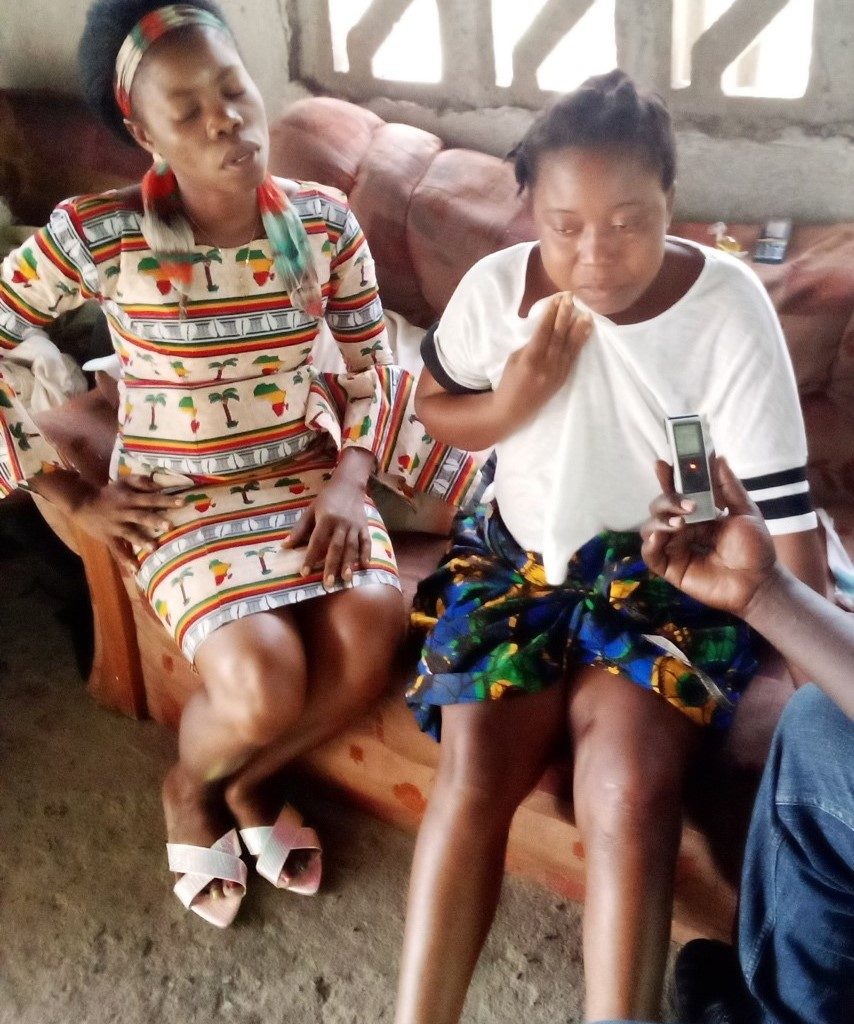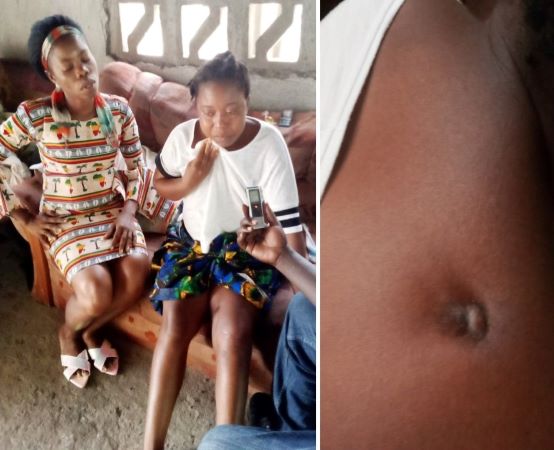PHOTO: Dolokon wiping her tears in our News Public Trust interview (Left) A bullet wound scar at the back of Dolokon’s shoulder blade (Right).
By William Selmah, with New Narratives
PAYNESVILLE, Liberia – In the quiet suburb of Cow Field community, in the Duport Road part of Paynesville, Tenneh Dolokon, 26, sits on a worn cushion and stares out at the marshland on the fringes of her unfinished house. She spends much of every day like this.
Dolokon was a toddler in 1994, when rebels of the Liberia Peace Council (LPC) attacked Vroblah in Bong County, where she lived with her parents. Both her father and mother died in the attack, and she was severely injured in her right shoulder and left leg. She is now bound to a chair.
The Liberian Civil War ended nearly 17 years ago, ceasing a bloodbath that killed an estimated 250,000 people. But for many war victims like Dolokon, who still bear scars and carry wounds, the war has not ended.
“We have taken Tenneh from hospital to hospital, from place to place and don’t really know what to do now about her condition,” says Annie Saybay, her caregiver and aunt, with tears in her eyes.
Dolokon’s plight has weighed heavily on Saybay and the rest of the family. Saybay had to forgo her petty trade and gardening to take care of her niece. “Nothing she is able to do by herself. To go to the bathroom, to go to the bedroom, get up in the morning, someone must be there to help. The only thing she is able to do now is cry, cry and cry.”
The Truth and Reconciliation Commission (TRC) recommended in its 2009 report that the government of Liberia should pay reparations to victims and survivors. Yet that has not happened more than a decade after the release of the commission’s report, and no alleged perpetrators have been held to account in connection to the violent 14-year conflict in the country. The TRC heard testimonies from a total of 124,225 survivors. They told of murder, torture, forced displacement, rape and enslavement.

There are no funds available for victims like Dolokon, according to Rev. Bartholomew Colley, acting chairman of the Independent National Commission on Human Rights (INCHR). Colley is concerned that any compensation for Dolokon will spark a flurry of similar cases that he says the INHRC cannot handle. He, however, admits that her situation is insightful. “We need to join to document and build some advocacies around Dolokon’s case and use it as a case study to draft a policy,” says Colley.
Dolokon nearly died with her parents in that LPC attack. When the sounds of gunshots and machetes stopped and the quietness of death descended on Vroblah, a few residents crept back to the town and saw her among the horrors. They found her with gunshot wounds, clinging to her mother’s lifeless, bullet-ridden body.
LPC, an offshoot of the Armed Forces of Liberia (AFL), vied for control of the rubber and timber of the southeast against the National Patriotic Front of Liberia (NPFL) in the mid 1990s. It battled the NPFL in the midlands of Bong and Grand Bassa. The group committed 16,708 wartime atrocities – 10 percent of the total in Liberia and the third most recorded by the TRC. Its founder, Representative George Boley of Grand Gedeh County, was recommended by the TRC to face prosecution for war crimes. In 2012, an American court extradited Boley from the United States back to Liberia for murder and recruitment of child soldiers during the war.
Some neighbors took Dolokon along with them to their hideout and turned her over to her surviving relatives, who treated her sores with herbs from the bush. But they did not know she was carrying bullets in her body. That was just the beginning of tougher years to come for her. Her story is similar to that of Rufus Kartee, who still bears the bullet wounds he sustained in the infamous St. Peter’s Lutheran Church Massacre in 1990.
“It is a pity, and it is unfortunate for victims of the war who find themselves in such heart-wrenching conditions,” says Adama Dempster of the Secretariat for the Establishment of a War Crimes Court in Liberia (SEWACCOL). “It is totally unfair because, after bearing the agony of war, they should not go through another round of suffering as in the case of [Dolokon].”
The government of Liberia must compensate victims for damages and injuries in order to achieve genuine peace and reconciliation, says Dempster. “We will continue to remind the government that the burden is on their shoulders to bring closure to all of the wounds created by the civil war,” he says. “One way to accomplish this is to implement the TRC recommendations, including reparations for war victims.”
Peterson Sonyah, the head of the Liberia Massacre and Survivors Association (LIMASA), supports Dempster’s position. “Why should notorious perpetrators of war crimes continue to live luxurious lives while their victims walk in pain, poverty and disgrace?” asks Sonyah, who survived the Lutheran Church massacre in 1990. “We must put an end to this.”
Sonyah’s organization is mobilizing survivors and victims across the country for a pending meeting in Gbarnga on reparations payment. That meeting, he reveals, will be followed by mass sit-in protests before the Capitol Building and the Ministry of Foreign Affairs, which currently houses the office of President George Weah of Liberia. “We won’t leave until they pass into law the war crimes court and reparations for war victims,” Sonyah says.
The Weah-led government has not shown support for the war crimes court, but there are hopes it will be created with time. Fifty of 73 representatives have signed a resolution to create the court, and there is support for it among international partners, including the U.S. Congress.
After her rescue, Dolokon seemed fine at first, walking and playing with other children. But as the years passed, her condition deteriorated. Walking progressively became more and more painful, until she could no longer walk.
The charity Mercy Ships performed surgery on Dolokon in the early 2000s and extracted a bullet from her leg, according to her aunt Saybay. She seemed to recover following the operation and attended school until she reached sixth grade. However, after some time, her situation worsened once more, forcing her to quit school for good. She has not walked since then. Other doctors that examined her said the bullet that entered her leg might have hit a bone, says Saybay.
“I want to get well; I don’t want to die like this,” Dolokon says tearfully with quivering lips as she struggles to find relief in her seat. She grimaces frequently throughout our interview. When she stretches her swollen legs to find comfort, a deep gunshot wound scar is visible on the back of her shoulder blade. Tears stream down her sorrowful face as she regrets not being able to pursue her dream to become a classroom teacher.
Saybay tries in vain not to cry, too. “For Tenneh, the civil war is still on; the war has not ended for her,” she says with watery eyes, pleading to the public for help. “Though we say the war ended in 2003, not so with Tenneh. If God forbid she dies in this condition, she died in the war.”
This story was a collaboration with New Narratives as part of the West Africa Justice Reporting Project.

